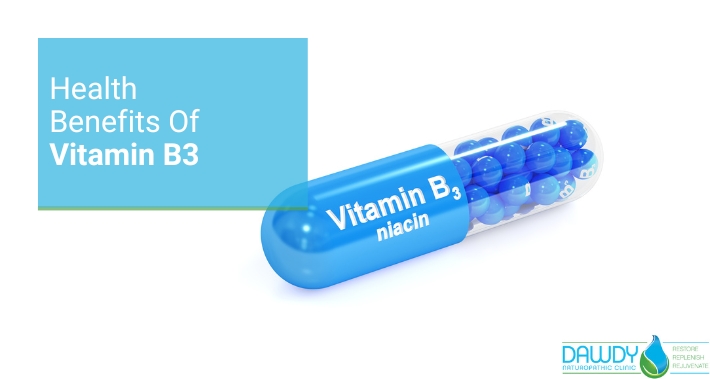Health Benefits Of Vitamin B3

Are you getting enough vitamin B3 in your diet?
Vitamin B3, also known as niacin, has a wide variety of different benefits.
I’m Dr. Kimberly Dawdy, a naturopathic doctor in Ottawa, and at my naturopathic clinic I often discuss the importance of vitamins and nutrients with my patients.
Lately on our naturopathic blog, we’ve been exploring the various essential nutrients your body needs.
Today, we’re going to be talking about vitamin B3 in more detail.
Keep reading to find out more about what vitamin B3 is, its health benefits, its food sources, and what happens when you don’t get enough of it.
What Is Vitamin B3?
Vitamin B3 is one of the eight water soluble B vitamins.
It’s the third B-complex vitamin we’ve looked at, after vitamin B1 and vitamin B2.
These vitamins are essential for maintaining your body’s functions and helping it run optimally.
There are two main chemical forms of niacin.
They are nicotinic acid and niacinamide, or nicotinamide.
Niacin is primarily responsible for synthesizing the coenzymes nicotinamide adenine dinucleotide (NAD) and nicotinamide adenine dinucleotide phosphate (NADP).
Both of these are involved in many of your body’s biochemical reactions.
They’re particularly involved in converting food into energy.
Niacin also acts like an antioxidant, plays a role in cell signaling, and helps create and repair DNA.
What Are Vitamin B3’S Benefits?
Vitamin B3 has a wide range of different benefits.
Let’s take a look at some of them.
1. It Can Help Manage Blood Pressure
Vitamin B3 may play a role in preventing or improving high blood pressure.
High blood pressure, or hypertension, occurs when the pressure in your blood vessels is too high.
If left untreated, it can cause kidney disease, heart disease, and stroke.
Vitamin B3 releases prostaglandins, which are chemicals that help your blood vessels become wider.
This can help improve your blood flow as well as reduce your blood pressure.
2. It Can Help Balance Cholesterol Levels
Blood fats, also known as triglycerides, circulate in your bloodstream alongside cholesterol.
Vitamin B3 can help balance cholesterol levels by increasing your HDL (good) cholesterol, reducing your LDL (bad) cholesterol, and reducing your triglyceride levels.
Maintaining healthy cholesterol levels can decrease your risk for heart disease and stroke.
It’s important to keep in mind that using vitamin B3 as a treatment for high cholesterol is only effective if taken in high doses.
However, high doses of vitamin B3 can increase your risk of developing gastrointestinal problems, glucose intolerance, and liver damage.
Because of the potential risks, it’s important to consult your naturopathic doctor before using vitamin B3 for this purpose.
3. It’s Good For Your Skin
Taking vitamin B3 orally or applying it to your skin topically as a lotion can help protect your skin cells from sun damage.
It may help prevent the development of certain types of skin cancer as well.
Vitamin B3 also aids your skin in retaining its moisture content and preventing water loss.
This can keep your skin smooth and combat wrinkles and the look of aging.
4. It Can Help With Brain Fog
Vitamin B3 is an important nutrient that your brain needs.
Vitamin B3 helps to synthesize the coenzymes NAD and NADP, which we talked about above.
These are what your brain uses to get the energy it needs to function.
It also plays a role in protecting your brain cells from inflammation.
So it’s no wonder that one of the common symptoms of severe vitamin B3 deficiency is brain fog and memory loss.
Researchers are exploring vitamin B3’s use in treating schizophrenia and Alzheimer’s as well, but that’s not yet conclusive.
5. It Can Help Manage Type 1 Diabetes
Type 1 diabetes is an autoimmune disorder.
RELATED: Naturopathic Immune System Support
With type 1 diabetes, your body attacks and destroys its own insulin creating cells within your pancreas.
Vitamin B3 can be an important part of a type 1 diabetes diet.
It may help you manage type 1 diabetes by protecting the insulin producing cells in your pancreas.
It may also decrease the risk of children who are more prone to developing type 1 diabetes.
When it comes to type 2 diabetes, however, it’s a little different.
Vitamin B3 may help lower cholesterol levels, but it can also increase blood sugar levels.
Make sure to consult with your naturopathic doctor before taking vitamin B3 if you have type 2 diabetes.
RELATED: Naturopathic Treatments for Diabetes

What Foods Are High In Vitamin B3
You can obtain vitamin B3 naturally from a variety of food sources.
Foods such as fish, greens, meat, poultry, eggs, and nuts contain vitamin B3.
Some common food sources of vitamin B3 include:
- Roasted turkey breast
- Grilled chicken
- Dry roasted peanuts
- Baked potatoes
- Cooked brown rice
- Liver
- Avocado
Generally, you can get an adequate amount of vitamin B3 simply through eating a healthy, nutritious, and varied diet.
However, if you’re not getting enough vitamin B3 through food sources and have a deficiency, it’s also available as a supplement.
What Does Vitamin B3 Deficiency Look Like?
Having a vitamin B3 deficiency can result in developing a condition called pellagra.
There are two types of pellagra.
Primary pellagra happens when you aren’t getting enough vitamin B3 through your diet.
Secondary pellagra happens when your body isn’t able to properly absorb vitamin B3.
Pellagra can cause neurological, gastrointestinal, and skin issues.
Symptoms of pellagra can include:
- Inflammation of the skin
- Diarrhea
- Dementia
- Fatigue
- Abdominal pain
- Swelling of the tongue
- Vomiting
- Ulcers in the mouth
- Indigestion
- Nausea
- Cheilitis, or inflamed lips
- Skin rashes
- Skin discoloration
- Scaly skin
- Anxiety and depression
- Confusion
- Memory loss
Left untreated, pellagra can be life threatening.
If you have primary pellagra, simply eating foods rich in vitamin B3 will help.
However, if you have secondary pellagra, it’s generally related to another health condition.
Either way, it’s a good idea to consult with a naturopathic doctor.
Can You Overdose On Vitamin B3?
Getting too much of a nutrient is called toxicity.
This is the opposite of deficiency.
Vitamin B3 toxicity is very difficult through diet alone.
However, vitamin B3 supplements have higher levels than what you’d get from food.
Taking too many of those can cause some issues.
One common effect is what’s called flushing.
It causes your skin to redden, accompanied by feelings of burning or itching.
Flushing isn’t generally harmful on its own.
However, other side effects of vitamin B3 toxicity can include:
- Liver toxicity
- Nausea
- Vomiting
- Gastrointestinal issues
- Low blood pressure
- Stomach ulcers
- Changes in heart rhythm
- Changes to glucose levels
If you have existing health conditions such as diabetes, hypertension, cardiovascular issues, or liver or kidney disease, you may be at higher risk for symptoms.
As a naturopathic doctor, I can help you determine whether vitamin B3 supplements are right for you.
Book Your Appointment With Dawdy Naturopathic Today
Are you getting enough vitamin B3 in your diet?
Or are you wondering about your nutritional intake in general?
If so, I’m Dr. Kimberly Dawdy, ND, and I can help.
Book your appointment with Dr. Kimberly Dawdy, ND, today.
Yours in Health,
Dr. Kimberly Dawdy, ND
Dawdy Naturopathic Clinic
6899 Sunset Blvd,
Greely, ON K4P 1C5
-https://g.page/dawdynaturopathicclinic
Dawdy Naturopathic Clinic offers a variety of naturopathic health solutions for individuals and families in Ottawa and the surrounding area.



